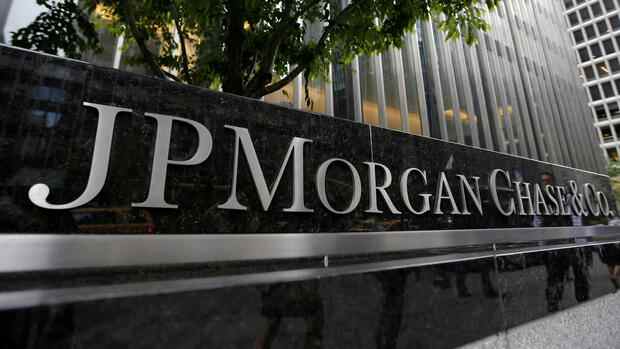The largest US bank made 43 percent less revenue in the investment banking business than in the previous year.
(Photo: Reuters)
New York, Frankfurt At the beginning of the week, Jamie Dimon issued a clear warning: The JP Morgen boss fears a “very, very serious” mixture of different risks, including the banker’s rising inflation, but also the Ukraine war. The global economy could tip into recession by the middle of next year, according to Dimon. Wall Street’s preparations for this difficult time have already begun.
JP Morgan, America’s largest bank, on Friday reported a profit for the third quarter of this year fell 17 percent year-on-year to $9.7 billion. The institution posted a total of $808 million in provisions for impending loan defaults. For comparison: A year earlier, the bank had been able to release 2.1 billion dollars in risk provisions that it had formed for the consequences of the corona pandemic. The release of these funds had additionally boosted profits at the time.
Competitor Wells Fargo also accrued an additional $784 million from July through September this year. “We expect a steady increase in payment defaults and ultimately credit losses, only the timing remains unclear,” said CEO Charlie Scharf. Overall, Wells Fargo’s profits fell 31 percent year-on-year to $3.53 billion, partly due to a scandal involving fictitious customer accounts.
Citigroup also increased its loan loss provisions by $370 million in the third quarter. Analysts had previously estimated that the six largest banks in the US could save a total of almost five billion dollars in risk provisions for loans at risk of default.
Top jobs of the day
Find the best jobs now and
be notified by email.
Investment banking continues to weaken
In addition to the provisions, the largely idle business with mergers and acquisitions (M&A) burdens the balance sheets of the banks. Last year’s M&A boom helped make 2021 one of the most profitable years ever for Wall Street’s big houses. In 2022, however, rising interest rates, geopolitical risks and fears of a global economic crisis caused the M&A business to collapse.
“Investment banking has been the business most negatively impacted by the economic environment, with a reduced appetite for mergers and acquisitions,” said Citigroup CEO Jane Fraser.
The absence of M&A deals caused Citi’s investment banking earnings to shrink more than 60 percent year-over-year to $631 million, also bringing the institution’s July-September total net income down nearly a quarter year-on-year to 3, 5 billion dollars fell, as the money house announced on Friday.
US competitor Morgan Stanley also recorded a 55 percent slump in the investment banking business compared to the previous year. It also caused the institute’s net income to fall 30 percent year-over-year to $2.49 billion.
Company boss James Gorman said he was not dissatisfied with the figures for the months of July to September: “The company’s performance was robust and balanced in an uncertain and difficult environment.”
At JP Morgan, profits in this division fell 43 percent on sales of $1.7 billion.
Nevertheless, three banks exceeded analysts’ expectations
Despite the falling profits of the major US banks, the results of JP Morgan, Citi and Wells Fargo exceeded analysts’ expectations, who had expected an even sharper decline.
Only Morgan Stanley fell short of analysts’ expectations. The bank’s shares fell 2 percent in early trading.
Bank stocks have already been hit hard this year. The shares of JP Morgan, Bank of America and Citigroup have each lost a good third of their value since the beginning of the year. They did worse than the broad leading index S&P 500, which was down around 23 percent over the same period.
JP Morgan boss Dimon expects further turbulence. He fears that the US Federal Reserve (Fed) will not be able to achieve a so-called soft landing in its fight against inflation, where it gets a grip on inflation without the economy slipping into a deep recession. Should there be a deep economic crisis, “one can assume that the markets will collapse another 20 to 30 percent,” said Dimon on Thursday at the conference of the International Institute of Finance in Washington.
US inflation data for September, also released on Thursday, came in higher than expected. Dimon believes it will be quite a while before prices normalize. Observers expect the Fed to raise interest rates by 0.75 percentage points at its next two meetings in November and December. Some economists had hoped the Fed would take a break from its tough rate-hike stance. But this is now considered unlikely in view of persistently high inflation.
With agency material.
More: Major Swiss bank UBS warns of turnaround in interest rates – end for the real estate boom?
